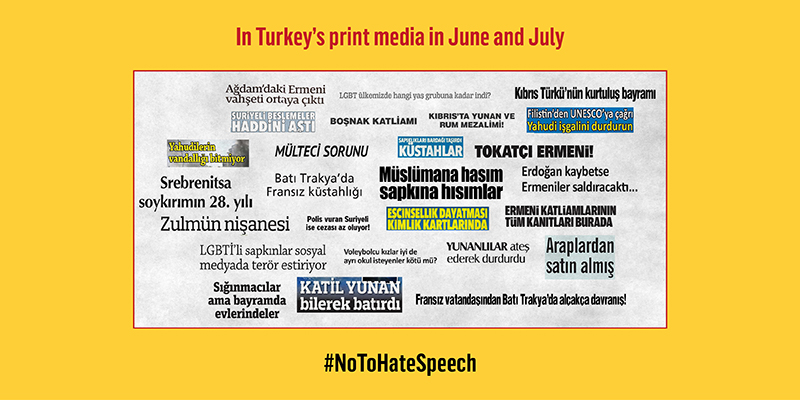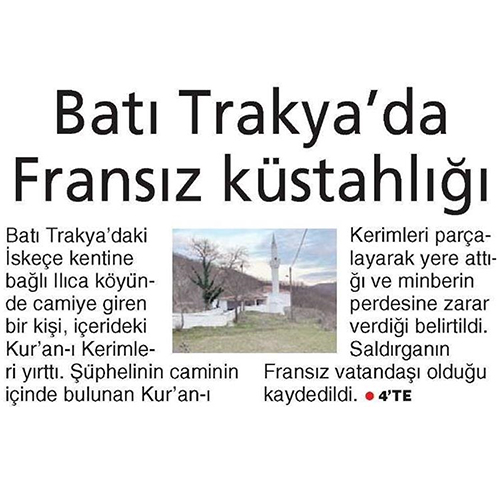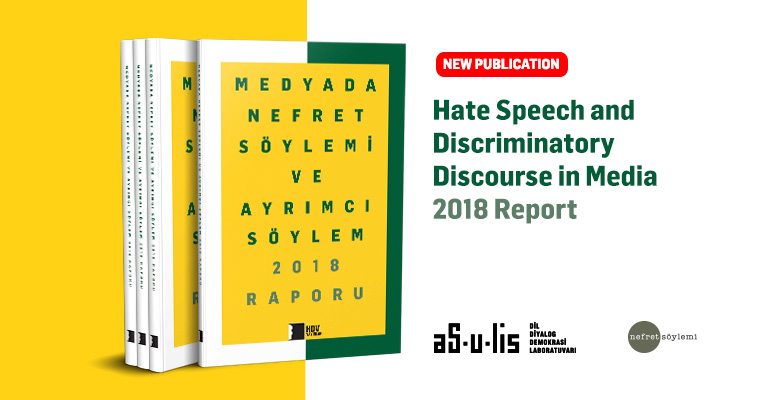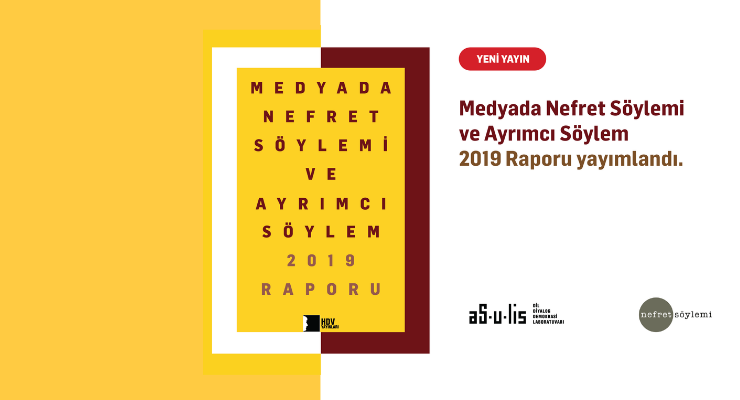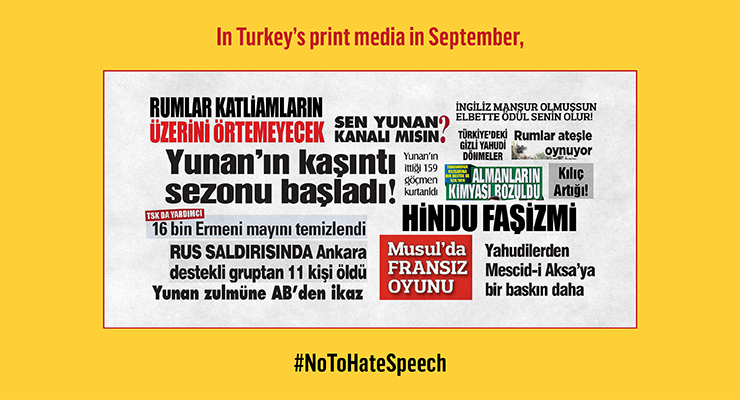Using critical discourse analysis, we evaluated news articles and columns that were published in Turkey’s national and local press in June and July 2023 that targeted national, ethnic, and religious identities, LGBTI+ and women. You may access news clippings and detailed analysis at “Hate Speech in the Press: Our Selections from June and July”.
In Turkish print media within the months of June and July;
- Greek Cypriot (Rum) identity was characterized as aggressive within reports on the 49th anniversary of the Cyprus Peace Operation.
- Refugees were the target of hate speech when it was stated that they pose a threat to the social order and their identity was associated with crime.
- The perception that LGBTI+ people pose a threat to society was reinforced by the use of stereotypical negative adjectives.
- Jewish identity was held responsible for the actions of a group and described as offensive.
- Greeks were targeted by being associated with ‘cruelty’ in news reports regarding boats with refugees in the Aegean Sea.
- In news articles related to history and current events, Armenian identity was targeted by being associated with war and conflict.
- Serbian identity was held responsible for the Srebrenica Massacre in news columns.
|
17 June 2023 |
1. Yeni Mesaj, “French Insolence in Western Thrace” This news article reports on the claim that a French citizen in Xanthi, Western Thrace broke into a mosque and tore up the Holy Quran. Despite the fact that the identity is not related to the crime, the headline places responsibility for the incident on French identity with the word 'insolence', a negative adjective used often in similar news articles. As such, prejudices against the French are reinforced.
|
|
18 June 2023 |
2. Yeni Akit, “If Erdoğan had lost, Armenians would have attacked…” This column evaluates the relationship between Armenia and Azerbaijan after the presidential election in Turkey. The author conveys the assumption that if the election had ended differently, the problems between Armenia and Azerbaijan would have resurfaced and Armenia would have attacked Azerbaijan. However, while the aforementioned assumption is stated in the headline, Armenian identity is associated with violence with the phrase 'would have attacked'. In this way, existing hostility towards the Armenians is reinforced.
|
|
20 June 2023 |
3. İlk Sayfa Gazetesi, “To what age group has LGBT come to in our country?” This column conveys the statements of the President of the World Correspondents' Association in Turkey regarding LGBTI+ people and a photograph taken at Kavaklı Primary School with a teacher and her students in front of a rainbow. In these statements, LGBTI+ people are associated with 'perversion', 'deviance', and 'immorality'. The visibility of LGBTI+ people is presented as problematic through criticisms of the Pride Parade and of the artists and municipalities supporting it. In addition, in the statements regarding the photo taken at the primary school, LGBTI+ people are accused of posing a 'threat' to families, society, and especially children. As such, LGBTI+ people are targeted with hate speech and hostility towards LGBTI+ people are reinforced.
|
|
20 June 2023 |
4. Yeni Akit, “enemy of Muslim, relative of perverts” This news article conveys the statements of representatives of National CSOs and the Chairman of the Unity in Opinion and Struggle Platform targeting LGBTI+ people and institutions and organizations that support them. In these statements, the perception that LGBTI+ people pose a 'threat' and 'danger' to society is reinforced by associating them with 'terrorist organizations' and 'perversion'. In addition, with these statements, LGBTI+ people, institutions and organizations that support them are described as 'anti-Islamic' and a binary opposition and hierarchy is created between Muslims and LGBTI+ people. As such, with the negative adjectives used in the article’s content, hate speech against LGBTI+ people is produced.
|
|
20 June 2023 |
5. Yeni Dönem, “ALL THE EVIDENCE OF ARMENIAN MASSACRES IS HERE” This news article is about a library in Erzurum being named after an academician working on Turkey-Armenia relations. The statements of a politician who delivered a speech at the opening of the library are written in the headline without using quotation marks. The statement in question generalizes the actions for which Armenian gangs were held responsible to the entire Armenian identity. As such, Armenian identity is associated with the phrase 'massacre', and hostility towards Armenians is reinforced.
|
|
21 June 2023 |
6. Türkiye, “MURDERER GREEK deliberately sank the boat” This news article is about the refugee boat that sank off the Peloponnese Peninsula of Greece. Based on the interviews with the survivors, it is reported that despite being aware of the ship, the Greek coast guard did not help or intervene, but left instead. However, the responsibility of the incident in question is placed on Greek identity in the headline. The use of negative adjectives in the headline and content associates Greek identity with violence and reinforces the existing hostility towards Greeks.
|
|
22 June 2023 |
7. Türkgün, “Armenian savagery in Aghdam exposed” This news article reports on the discovery of a mass grave presumed to be from the period of the First Karabakh War, which allegedly contains the bodies of Azerbaijanis killed by Armenian forces. With the allegations in question being written in the headline, Armenian identity is held responsible for the incident, and associated with violence by use of the expression 'savagery'. In this way, the current hostility towards Armenians is reinforced.
|
|
24 June 2023 |
8. Sözcü, "When the one shooting the police is Syrian, their punishment is less severe.” This column compares two incidents involving the police in Kayseri and Urfa. In the Kayseri incident, a person alleged to be a Turkish citizen who threatened the police was given a long sentence. On the other hand, in Urfa, a person who allegedly came from Syria, sold drugs and injured two policemen was given a short one. With the comparison of these two events through identity, the supposed discrepancy in punishment is presented as problematic. Emphasizing Syrian identity even though it is not related to crime while also not including the identity of the other person in question, reinforces the perception that Syrians pose a threat. As such, hostility towards Syrian refugees is fueled.
|
|
27 June 2023 |
9. Aydınlık, “IMPOSITION OF HOMOSEXUALITY ON ID CARDS” This news article cites a politician's statement on the inscription of the English word 'gender' on newly issued identity cards, where she states that gender based on declaration should not be accepted. The word gender on the cards is described as an 'imposition' and she asks them to be removed from the cards. The existence of gender identities and sexual orientations other than heteronormative is thus presented as problematic.
|
|
28 June 2023 |
10. Yeni Asır, “GREEKS stopped them by shooting” It is reported in the news report that two persons who were allegedly trying to drop off migrants on the Greek island of Batnoz did not obey the stop warning while fleeing towards Turkey and were therefore stopped with warning shots fired by the Greek coast guard. However, in the headline, the responsibility for the event is generalized to Greek identity and Greeks are associated with 'violence'. Hostility towards Greeks is thus reinforced.
|
|
29 June 2023 |
11. Gazete Pencere, “Asylum seekers, but they go home for Eid” The news article reports the claim that Syrian refugees went to Syria for Eid and a driver's reaction to it. In the driver’s reaction in question, the return of refugees to Turkey after visiting Syria while there is still a war in Syria is presented as problematic. It is claimed that if refugees can visit Syria, then there isn’t a state of war there and they should return to Syria. The propagation of this claim without confirmation, which is repeated every Eid, targets Syrians and distorts the situation in Syria.
|
|
30 June 2023 |
12. Karadeniz, “THEIR PERVERSIONS WERE THE LAST DROP, THOSE INSOLENTS” This news article claims that two people who came to Turkey from Afghanistan took pictures of women and shared them. The claim that the people in question are Afghans is emphasized without confirming the accuracy of the incident. Although identity is not related to the crime, it is generalized to Afghan identity. The way refugees come to the country is presented as problematic and the news claims that they constantly commit crimes with the phrase 'their crimes never end'. With these statements, both the perception that Afghans pose a threat and hostility towards Afghans are fueled.
|
|
2 July 2023 |
13. Yeni Akit, “LGBT deviants are terrorizing social media” This news article conveys the warnings of the GLAAD community to social media platforms, reminding them of the precautions these platforms should take against discrimination and hate speech against LGBTI+ people. These measures, which are important for the existence and visibility of LGBTI+ people, are stated as 'order' in the news. Hate speech against LGBTI+ people is also trivialized by calling it 'criticism'. In addition, the negative expressions used in the headline target LGBTI+ people and reinforce the current hostility towards them.
|
|
5 July 2023 |
14. Akşam, “THE SLAPPER ARMENIAN!” This news article reports that an Armenian athlete slapped an Azerbaijani athlete after competition in a karate championship in Batumi. However, in the headline, responsibility for the incident is generalized to Armenian identity even though identity is not related to the action. Another incident between athletes of the two countries is also mentioned in the story and again generalized to Armenian identity. As such, Armenians are targeted and prejudices against them are fueled.
|
|
10 July 2023 |
15. Önce Vatan, “GREEK AND RUM ATROCITY IN CYPRUS!” In this column, the relations between Greek, Greek Cypriot (Rum), and Turkish identities are explained by referring to the events of 1964 and 1974. Among these events, the shooting down of a Turkish Air Force plane making a warning flight in 1964 and the capture of Pilot Cengiz Topel are mentioned. However, Greek and Rum identities are held responsible for Topel’s experiences. Similarly, while the reasons for the landing on Cyprus in 1974 are mentioned, Greek and Rum identities are associated with negative adjectives such as ‘cruelty’ and 'massacre'. In the narrative of historical events, Greek and Rum identities are represented within a discourse of war. As such, the perception that Greeks and Rums pose a threat is reinforced by this discourse of hostility.
|
|
13 July 2023 |
16. Türkiye, “Mark of Cruelty” This news article reports on what happened between Armenians and Azerbaijanis in Zangezur in 1988 through an Azerbaijani recounting his memories. However, in the headline and body of the story, Armenian identity is held responsible for the actions of a group. With the expression used in the headline, Armenians are associated with 'cruelty'. The current perception of hostility towards Armenians is thus reinforced.
|
|
14 July 2023 |
17. Diyalog, “Bought from Arabs” This news article reports that a person in Nicosia was detained for possession of drugs which he had allegedly bought from an Arab person. In the headline, the Arab identity of the person is made the focus of the story and the actions are connected to Arab identity. Despite the fact that identity is not related to the crime, the perception that Arabs pose a threat is reinforced by emphasizing Arab identity.
|
|
15 July 2023 |
18. Bizim Anadolu, “REFUGEE PROBLEM” This column was written after the images of an alleged refugee group stepping on the flag and money of the Republic of Turkey came to light. This action is described as a ‘scandal’ and the latest of such acts by refugees, who are also associated with 'harassment'. In addition, the entry of refugees and asylum-seekers into the country is called an 'invasion' in the article. The increase in the number of refugees is presented as problematic and the existence of refugees is shown as a threat. This narrative is reinforced by the reproduction of common misconceptions, such as that refugees are exempt from taxation and can vote. With these allegations, prejudices against refugees are reinforced, and the perception of hostility towards them is further fueled by the discourse of conflict used in the article.
|
|
16 July 2023 |
19. Milat, “28th anniversary of the genocide of Srebrenica” On the occasion of the 28th anniversary of the Srebrenica Genocide, this column focuses on the events of that time. Identity is held responsible for what happened in that city, as Serbian identity is associated with the term 'massacre'. Serbian identity is targeted by being associated with crime. Furthermore, Serbian identity is demonized by stating that Serbs pose a 'threat' to Bosnia and Kosovo, and that what happened could happen again.
|
|
18 July 2023 |
20. Yeni Akit, “Jewish vandalism does not end” This news article is about a group of Jewish settlers attacking Palestinian houses and cars. However, in the headline, the responsibility for the actions of a Jewish group is generalized to identity and Jewish identity is associated with 'vandalism'. By associating identity with crime, the perception that Jews pose a threat is reinforced. As such, the perception of hostility towards Jewish people is further fueled.
|
|
18 July 2023 |
21. Yeni Akit, “Palestine's call to UNESCO: Stop the Jewish occupation” This news article reports that the Palestinian Prime Minister called on UNESCO to protect cultural heritage sites in Palestine. In the content of the news, 'fanatic Jewish settlers' and the State of Israel are held responsible for damaging cultural heritage sites. In addition, the headline generalizes the actions of a group to a whole identity. These actions, described as an 'occupation', are associated with Jewish identity. As such, both the perception that Jewish identity poses a threat and hostility towards them are reinforced.
|
|
20 July 2023 |
22. Türkiye’de Yeniçağ, “Liberation Day of Turkish Cypriots” This news article is about the celebrations held for the 49th anniversary of the Cyprus Peace Operation. In the headline, the operation is called the 'liberation day’, while Greek Cypriot (Rum) identity is blamed for what happened with the expressions 'Rum genocide' and 'Rum cruelty' in the story. Rum identity is associated with violence, and hostility towards them is reinforced.
|
|
22 July 2023 |
23. Karadeniz, “SYRIAN BESLEMES HAVE GONE TOO FAR” The new article is about a gang called the 515 Hashimi in Turkey and their actions. It is reported that the name of the gang was taken from a group that rebelled against the Ottoman Empire, various crimes are listed among their actions, and it is stated that they pose a threat. Although the responsibility for the actions described in the story belongs to a group, the headline attributes the gang's actions to Syrian identity. While the expression ‘besleme’ (maidservant in English) in the headline is used to humiliate the Syrian identity, the expression ‘go too far’ implies a possible threat to Syrians. In the hierarchical relationship established between Turkish and Syrian identities, Syrian identity is positioned lower and hostility towards Syrians is reinforced.
|
|
22 July 2023 |
24. 24 Saat Gazetesi, “There is no problem in Cyprus, there is 49 years of peace” This column claims that the Cyprus Peace Operation brought peace in Cyprus by focusing on the historical developments. What happened in 1963 is called an 'atrocity' and Greek Cypriot (Rum) identity is associated with the 'massacre'. The article emphasized that the events resumed in 1967 and used the expression 'Rum attacks'. With these statements, the Rum identity is associated with aggression and the responsibility for what happened is placed on them.
|
|
22 July 2023 |
25. Önce Vatan, “MASSACRE OF BOSNIAKS” This column is about the events that took place in Bosnia and Herzegovina after the collapse of Yugoslavia. It is claimed that the main reason for the incidents in question is 'hostility towards Muslim and Turks'. In addition, by referring to different historical events such as the Balkan Wars, the responsibility of these events is attributed to different identities. In the events that took place, Serbian, Croat, and Armenian identities are targeted by associating their identities with crime.
|
|
23 July 2023 |
In this column, the championship of the National Women's Volleyball Team, the celebrations of the championship, and criticisms of co-education are discussed. When talking about the celebrations, LGBTI+ people are targeted with frequently-used negative adjectives such as 'perverted'. In addition, LGBTI+ people are referred to as the 'global LGBT lobby' as if they are part of an organization, reinforcing the claim that they pose a threat to society. Through a call to action to the Ministry of Youth and Sports, the General Directorate of Sports, and the Volleyball Federation, the article problematizes the existence and visibility of LGBTI+ people . Hate speech against LGBTI+ people is thus reinforced, and the current hostility towards them is further fueled.
|

This project is financed by the European Union.


